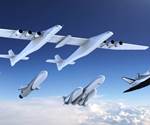Stratolaunch cuts launch vehicle and rocket engine programs
Stratolaunch has reportedly backed off of development of a family of launch vehicles that were intended to use the company’s all composite carrier aircraft as a launch platform.
Stratolaunch (Seattle, WA, US), the company behind the world’s largest all-composites aircraft, has reportedly backed off of its development program of a family of launch vehicles that were intended to use the company’s carrier aircraft as a mobile launch platform.
The company says, “we are streamlining operations, focusing on the aircraft and our ability to support a demonstration launch of the Northrop Grumman [Falls Church, VA, US] Pegasus XL air-launch vehicle.”
According to Aerospace Daily & Defense Report, the end of the launcher program comes just weeks after tests of its PGA rocket engine’s preburner at NASA Stennis Space Center (Hancock County, MS, US) – and three months after Stratolaunch founder Paul Allen, passed away from complications of lymphoma.
The family of launchers was planned around two expendable modular rockets powered by the PGA engine: a medium launch vehicle (MLV) with a 3,400 kg payload capacity and a medium launch vehicle-heavy with a 6,000 kg payload capacity. A medium-class payload reusable space plane was also part of the program.
Related Content
-
Plant tour: Collins Aerospace, Riverside, Calif., U.S. and Almere, Netherlands
Composite Tier 1’s long history, acquisition of stamped parts pioneer Dutch Thermoplastic Components, advances roadmap for growth in thermoplastic composite parts.
-
Infinite Composites: Type V tanks for space, hydrogen, automotive and more
After a decade of proving its linerless, weight-saving composite tanks with NASA and more than 30 aerospace companies, this CryoSphere pioneer is scaling for growth in commercial space and sustainable transportation on Earth.
-
Industrializing additive manufacturing in the defense/aerospace sector
GA-ASI demonstrates a path forward for the use of additive technologies for composite tooling, flight-qualified parts.



